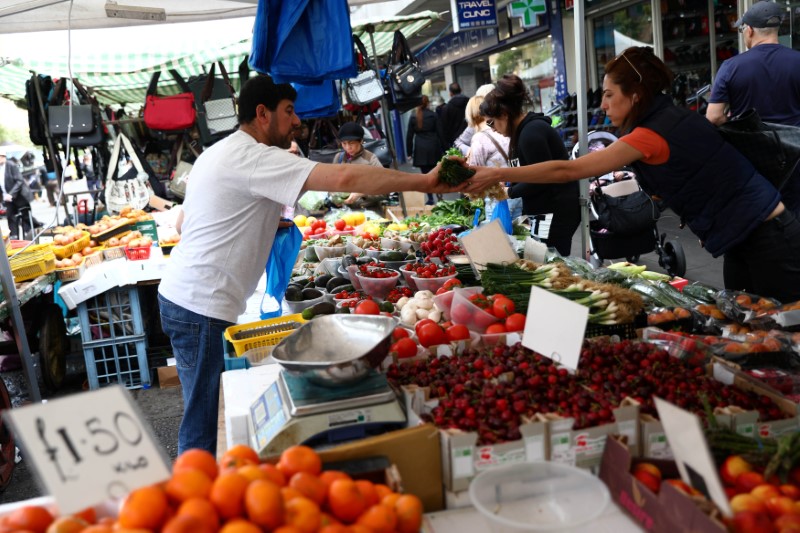By David Milliken
LONDON (Reuters) - Britain's economy slowed more sharply than first thought in early 2017 as consumers felt the hit from the rise in inflation that followed the Brexit vote and exporters struggled to benefit from the weak pound.
Thursday's downbeat official data - which contrasts with signs of acceleration in many other economies - comes two weeks before Britons vote in a national election.
Although employment remains at a record high, the economy has lost a lot of its momentum of last year as the impact of the decision to leave the European Union has started to be felt.
Gross domestic product grew at its weakest rate in a year during the first three months of 2017 at 0.2 percent, down from 0.7 percent in late 2016, the Office for National Statistics said, revising down an earlier 0.3 percent estimate.
By contrast, Germany's economy saw growth of 0.6 percent and Japan grew by 0.5 percent over the same period. Data published on Thursday showed Spain's economy picked up speed too.
"At this stage it is too early to call the UK the sick man of Europe," said Kathleen Brooks, research director at financial spread betting company City Index. "However, another quarter of weak numbers could justify this title."
Higher inflation - which now stands at 2.7 percent, compared with 0.5 percent before the Brexit vote - sapped consumer demand which previously had been the main motor of Britain's economy.
The ONS said household spending grew by the smallest amount since late 2014 after adjusting for inflation. Distribution - which includes retailers - shrank by the most since 2010.
CURRENCY HIT
Opinion polls show no sign that Britons who voted to leave the EU are regretting their decision. They also put Prime Minister Theresa May on track to win a large parliamentary majority on June 8.
She wants to turn the election into a vote on her ability to secure a good deal for Britain as it leaves the European Union, pushing the economy into the background in the campaign.
With Britain still a member of the EU, the biggest impact so far from last June's leave vote has been an 11 percent fall in the value of the pound against major currencies.
Consumers were initially insulated from the inflationary impact of the depreciation. But retailers who had hedged against a weaker currency are passing on higher prices now.
By contrast, British exporters have failed to get much benefit from being able to sell abroad more cheaply.
Export volumes fell 1.6 percent in the first quarter after a 4.6 percent rise at the end of last year - though economists warned that accounting changes over the treatment of gold made it hard to draw definitive conclusions.
The most positive news from Thursday's data came from business investment, which showed year-on-year growth for the first time since 2015.
Other recent data releases have shown retail sales picked up in April, and private-sector business surveys remain robust, giving economists some hope of a partial rebound.
The Bank of England expects economic growth of 1.9 percent this year. Most economists think it will be slower and they see little chance of an interest rate hike, even as inflation gathers speed.
The longer-term growth outlook is also uncertain.
One of May's main goals in Brexit talks is to regain control over migration to meet a pledge to cut the net number of migrants to under 100,000 a year, even if that leads to restrictions on British trade ties with the EU.
Opposition to unchecked immigration from the bloc was a key factor behind Britain's Brexit vote.
The ONS said some migrants were already leaving. Total net migration last year fell to 248,000 from 332,000 - its lowest since the 12 months to March 2014 - with a marked drop from eastern Europe.

Most economists say migration boosts the economy overall. "The UK is at risk of weaker growth if migration flows slow from here," HSBC economist Elizabeth Martins said.